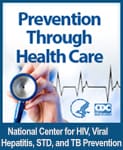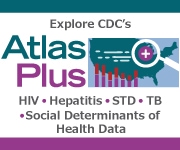30th Commemoration of HIV/AIDS
Podcast
To download, right click on the link, select “Save As” and save the file to your local computer.
Transcript
30 Years of HIV/AIDS
[Announcer 1] CDC needs your input! Take a short survey about our podcasts at www.cdc.gov/podcasts.
[Announcer 2] This podcast is presented by the Centers for Disease Control and Prevention. CDC – safer, healthier people.
June 5, 2011 marks the 30 year anniversary since the first reported cases of acquired immunodeficiency syndrome or AIDS. On June 5, 1981, an article in CDC’s Morbidity and Mortality Weekly Report reported on Pneumocystis carinii pneumonia in five previously healthy young men in Los Angeles, California. These cases were later recognized as the first reported cases of AIDS in the United States.
In reflecting on the epidemic, I like to think that we are entering the next decade of our fight against HIV and AIDS, with an aggressive focus on high impact prevention. Today, we have a National HIV/AIDS Strategy for the United States to guide those efforts. The Strategy calls for us to focus on those most affected by the epidemic, where our work can have the greatest effect.
HIV prevention has already saved countless lives, including an estimated 350,000 in the United States alone. New infections in the United States have decreased by more than two-thirds since the height of the epidemic and are also now decreasing globally. And the rates of HIV testing are at an all-time high. This not only saves lives, but needed dollars—it is estimated that more than $125 billion in medical costs alone have been averted in the United States.
Recent breakthroughs in HIV prevention have created exciting opportunities that can potentially open the door to much greater gains in prevention in the United States. However, much more needs to be done. Unless we increase the impact of our HIV prevention efforts, continued growth in the population living with HIV will lead to increases in new infections and massive new costs to our nation’s health care system.
More than 50,000 people become infected each year in the United States. New CDC data show that more than 1.1 million Americans are living with HIV, and as that number grows, opportunities for HIV transmission increase.
It is important that we maintain our resolve to end this epidemic. A new generation of Americans needs to be reached. Today’s young people have never known a time without effective HIV treatment. Even for many older Americans, the early days of AIDS seem distant.
Still, many Americans remain at risk. More infections are occurring among people under 30 years of age than any other age group. Data show significant new infections occurring among some middle-aged groups, especially gay and bisexual men in their 40s and 50s. We need to break through this complacency and put HIV back on the national agenda. The sooner we begin to cut the number of new infections, the more lives we will save.
On this 30th commemoration of the first reported cases of AIDS, let us remember those lost to this terrible disease, let us renew our commitment to service, and let us reenergize our focus. Thank you.
[Announcer 2]For the most accurate health information, visit www.cdc.gov or call 1-800-CDC-INFO, 24/7.

